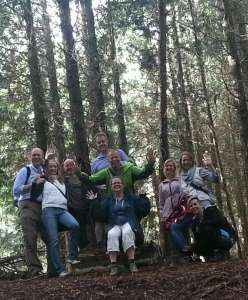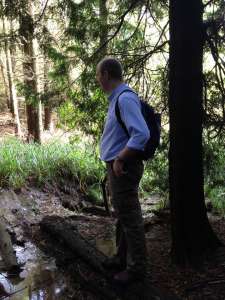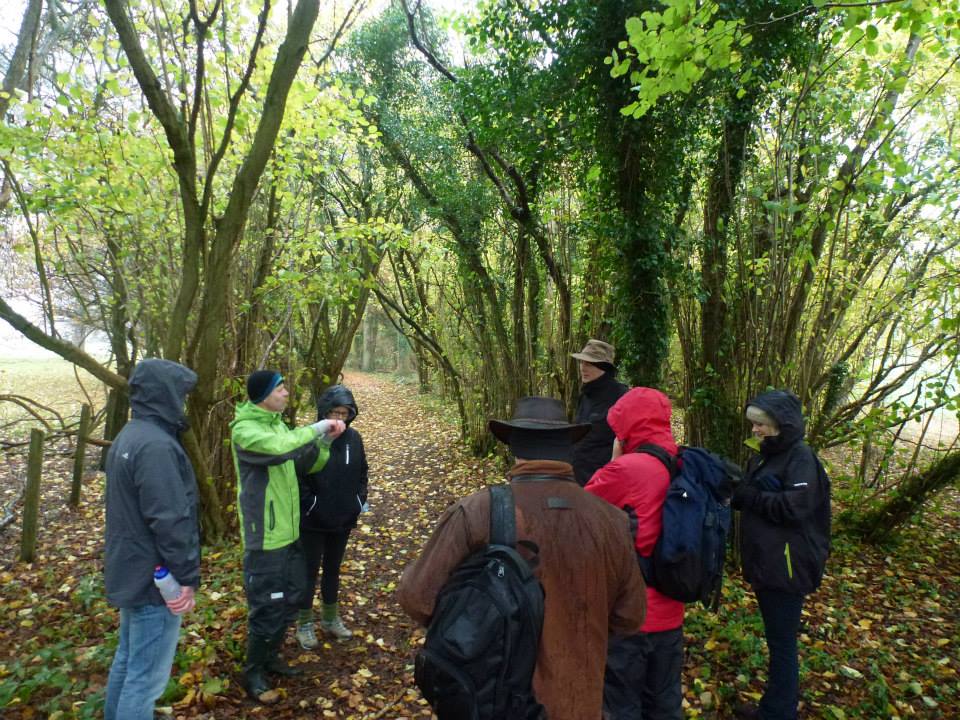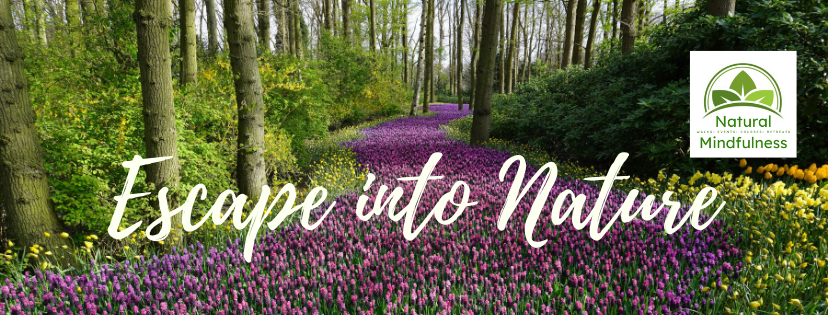Last August Lou was feeling the way we all have at some point: overworked, tired, and a bit panicky. She had just moved back from France to the UK after 30 years looking to start a new life and new business as a French language coach. “I knew I’d made the right move, but I was still worried about starting my own business,” she recalls. So when her brother asked her to join him on a guided three hour walk in the beautiful Cotswolds, she agreed, thinking she could use the distraction. This wasn’t just any hike in the woods, however— Ian was guiding people through a practice he calls “Natural Mindfulness” based on shinrin-yoku, which translates as “forest bathing,” or luxuriating in the woods. “We really focused on what we were seeing, hearing, and smelling,” says Lou. “It helped keep my mind off work and life decisions.”
 Your average walk in the park may help you relax a little, but Natural Mindfulness developed by Ian Banyard, requires participants to deliberately engage with nature using all five senses. Portions of the walks are often done in silence, and mobile phones are set to “airplane mode”, or switched off to discourage distractions. Walkers are encouraged to practice deep breathing and to tune in to what stimulates their senses, like the texture of birch bark or the scent of wild flowers, bird song and the vibrant colours and hues” says Ian Banyard, who is establishing Natural Mindfulness Walkshops in the Cotswolds and has plans to launch it throughout the UK and Worldwide.
Your average walk in the park may help you relax a little, but Natural Mindfulness developed by Ian Banyard, requires participants to deliberately engage with nature using all five senses. Portions of the walks are often done in silence, and mobile phones are set to “airplane mode”, or switched off to discourage distractions. Walkers are encouraged to practice deep breathing and to tune in to what stimulates their senses, like the texture of birch bark or the scent of wild flowers, bird song and the vibrant colours and hues” says Ian Banyard, who is establishing Natural Mindfulness Walkshops in the Cotswolds and has plans to launch it throughout the UK and Worldwide.
By combining mindfulness and spending time in nature—two activities that have restorative properties on their own— Practising “Natural Mindfulness” can bring about significant health advantages: A study conducted across 24 forests in Japan found that when people strolled in a wooded area, their levels of the stress hormone cortisol plummeted almost 16 percent more than when they walked in an urban environment. And the effects were quickly apparent: Subjects’ blood pressure showed improvement after about 15 minutes of the practice.
One of the biggest benefits may come from breathing in chemicals called “Phytoncides”, emitted by trees and plants. Women who logged two to four hours in a forest on two consecutive days saw a nearly 40 percent surge in the activity of cancer-fighting white blood cells, according to one study. “Phytoncide exposure reduces stress hormones, indirectly increasing the immune system’s ability to kill tumour cells,” says Tokyo-based researcher Qing Li, MD, PhD.
Learn more from this short video!
Even if you don’t live near a forest, studies suggest that just looking at green space—say, the trees outside your office window—helps reduce muscle tension and blood pressure. While forest bathing has become a common practice in Japan, it’s only just beginning to catch on here in the UK.
 John Denley, another member who is currently learning to guide “Natural Mindfulness Walkshops” to help people overcome depression, admits that some people might consider the walks a silly New Age trend. “Before I started monthly sessions, I thought, who’d want to come together to walk in silence?” he says. “But people need a break from what consumes them. And nature trails are a good place to do that because you also have to watch your step, which keeps you present in the moment.”
John Denley, another member who is currently learning to guide “Natural Mindfulness Walkshops” to help people overcome depression, admits that some people might consider the walks a silly New Age trend. “Before I started monthly sessions, I thought, who’d want to come together to walk in silence?” he says. “But people need a break from what consumes them. And nature trails are a good place to do that because you also have to watch your step, which keeps you present in the moment.”
Life Guide Ian Banyard who set up Cotswold Natural Mindfulness and leads the walks that Lou, John and a growing membership of walkers attend near his home in Gloucestershire, knows just how healing “Natural Mindfulness” can be: following a messy divorce, crippling debt and the death of his parents, Ian moved to the Lake District and spent 5 years immersed in the natural world. Walking the fells, forests and beaches in Cumbria’s beautiful Lakeland with his dogs, Ian reconnected to the natural world and explored his inner world. “I was miserable, moody, overweight and on the brink of a nervous breakdown in 2002” he explains. “Walking in a natural environment reminds us that we are nature. So when we get stuck in life the best way to reconnect to that natural flow is to return to nature”.
On returning to Gloucestershire in 2006 Ian had dropped over 40 pounds in excess weight, lowered his blood pressure, cholesterol, boosted his emotional intelligence and developed more clarity through the practice of walking mindfully in nature.

What we do doesn’t seem in any way extraordinary, but the effects are amazing,” he says. For Lou, John and other members, the walks have become a regular monthly practice: “There are some great benefits. When our members leave the Natural Mindfulness walkshops, they feel calmer, more reflective, more motivated and refreshed.
“I feel like I’m taking care of myself in a way that has a lasting impact.”
To learn more about Cotswold Natural Mindfulness guided walkshops visit: www.cotswoldnaturalmindfulness.uk or book onto a complimentary monthly walk. Call Ian Banyard on 01242 821136 or email: [email protected] to join the next walkshop.
Click to download this article: ![]()


